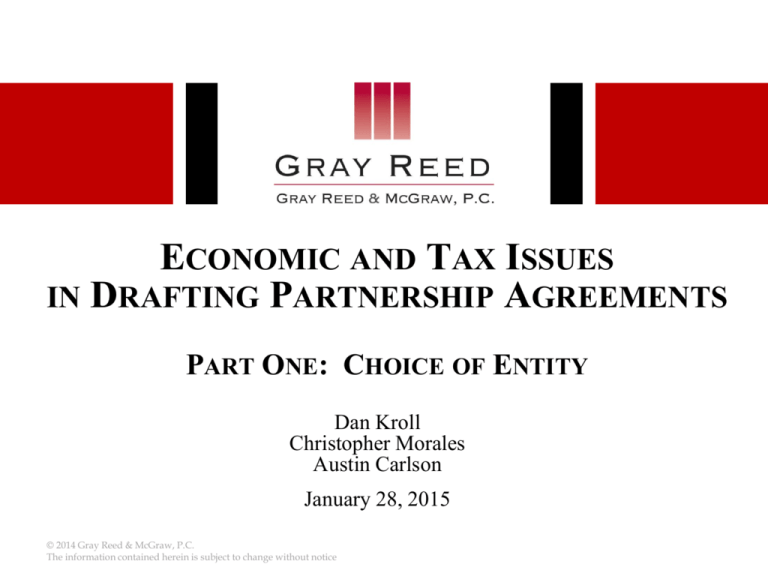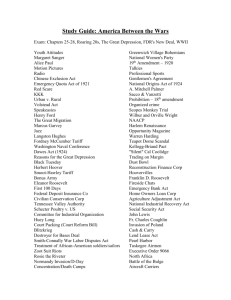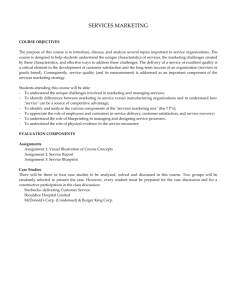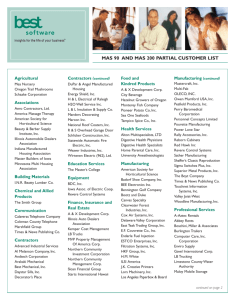Economic and Tax Issues in Drafting
advertisement

ECONOMIC AND TAX ISSUES IN DRAFTING PARTNERSHIP AGREEMENTS PART ONE: CHOICE OF ENTITY Dan Kroll Christopher Morales Austin Carlson January 28, 2015 © 2014 Gray Reed & McGraw, P.C. The information contained herein is subject to change without notice Before We Begin Highway to the Next Level Next Tax Level Professor Kroll You Objectives Better understanding of the two main drivers for choice of entity: Liability Planning Tax Planning Better understanding of why many investment structures are so complex. 4 Business Entity Choices Corporation C Corporation S Corporation REIT Tax Exempt Partnership General Limited LLP MLP Limited Liability Company Check the box flexibility 5 Non-Tax Considerations Limited Liability for Owners Management Corporation -- Board of Directors LLC -- Board of Managers or Managing Member/Sole Member Limited Partnership -- General Partner General Partnership -- Managing Partner 6 Non-Tax Considerations Ownership Flexibility Preferred Equity Junior Equity Economic Waterfalls Profits Interests Disproportionate Distributions 7 Tax Considerations Double Tax v. Single Tax Losses Trapped in Entity Basis Increase to Owners for Entity Income Tax Basis to Owners for Entity Debt Flexible Allocation of Tax Items Taxable In Kind Distributions Tax-Free Merger Inside Basis Increase to Buyer Upon Equity Sale “Blocker” function 8 C Corporation Double Tax Losses Trapped No Outside Basis Increase for Current Earnings In Kind Distributions Are Taxable Tax-Free Merger Possible 9 Double Tax Example Non-Corporate Shareholder $13 5 IRS $65 4 C Corporation $200 $100 2 1 Customer Revenue Expenses Net Income Less: 35% Corporate Tax After-Tax (Corporate) Less: 20% Dividend Tax To Shareholder After All Taxes 10 Expenses 200 -100 100 -35 65 -13 52 $35 3 IRS If the $65 of after-tax earnings are retained in the C Corporation, Shareholder's Tax Basis in the Shares does not increase Single Tax Example $20 Owners 5 IRS $100 4 S Corporation or Partnership $200 1 11 2 Expenses Customer Revenue Expenses Net Income Less: Corporate Tax After-Tax (Corporate) Less: 20% Shareholder Tax Retained Earnings $100 200 -100 100 -0 100 -20 80 $0 3 IRS Pass through entity distributes $100 to Owners Taxes; Owners pay $20 in tax, retain $80. Trapped Losses Shareholder Loss Allocation C Corp Losses incurred by C Corp may not be used by the Shareholder 12 Corporate Reorganizations Target Shareholders Target Corp Acquisition Corp Shares merger Acquisition Corp Merger Sub Exchange of Target Shares for Acquisition Corp Shares are tax-free to Target Shareholders 13 S Corporation Single Class of Stock Limited Number and Type of Shareholders No Allocation Flexibility Technical Election Procedures and Footfaults No basis allocation for Shareholder Debt In-Kind Distributions are Taxable No Disproportionate Distributions Allowed But Redemption Safe Harbor But, No Trapped Losses Basis Increase for Retained Operating Earnings 14 S Corporation Example A 50 Shares $50 $50 AB S Corp B 50 Shares AB S Corp spends $100 on deductible expenses Losses allocated 50/50 15 S Corporation Example - (continued) A $0 $100 AB S Corp B 100 Shares AB S Corp needs an additional $100 for Year 2 operations A does not have any money B funds all $100 AB S Corp issues 100 shares to B for the extra $100 investment Sharing Ratio is now 50 shares to A and 150 shares to B Year 2 losses allocated $25 to A and $75 to B even though losses were all funded by B 16 Basis Increase for S Corporation $40 Shareholder 5 IRS $40 4 S Corporation $200 1 17 2 $0 3 Expenses Customer Revenue Expenses Net Income Less: Corporate Tax After-Tax (Corporate) Less: 40% Shareholder Tax Retained Earnings $100 200 -100 100 -0 100 -40 60 S Corporation distributes $40 to Shareholder for Taxes; retains $60. Shareholder's Tax Basis Increases for the $60 of Retaining Earnings IRS Friends don’t let friends form an S Corp or a C Corp for a privatelyowned business. Exceptions Small business service companies with one owner and no possibility whatsoever of capital gain transactions C Corp to S Corp conversions • Basis Increase for Earnings • Avoid Trapped Losses • In-Kind Distribution Rule Usually Prevents an LLC Conversion Over 100 equity owners and cannot qualify as a Publicly Traded Partnership Business is certain it will exit in a stock-for-stock merger or will be purchased in a 338(h)(10) deal Blockers 18 Initial Public Offerings A B C merger ABC LLC A B ABC Corp Public C $ ABC Corp Unless the business can qualify as a publicly traded partnership, ABC LLC will need to convert to a corporation before it consummates an initial public offering. 19 Blocker Corporations Blocker corporations allow investors to indirectly receive income from domestic partnerships without being a direct partner. • Inbound foreign investment domestic corporate blocker • Tax exempt entity domestic corporate blocker • REIT subsidiary domestic corporate blocker 20 Blockers: Inbound Foreign Investment Blocker Foreign Investors A B C Domestic Corp (Blocker) Domestic Investors B C U.S. Partnership U.S. Real Estate Assets The blocker corporation pays tax on its share of the partnership's income. Foreign investors avoid US trade or business income tax and instead are only subject to tax in their home country on any dividends received. Foreign investors will not be required to file a U.S. income tax return. 21 Blockers: Tax Exempt UBTI Subsidiary Tax Exempt Entity Tax Free Dividends Domestic Corp. (Taxable Subsidiary) Other Investors B C UBTI Income U.S. Partnership Domestic corp. will hold all investments that generate UBTI income. Income will be taxed as corporate rates at the subsidiary level and passed tax free to the tax exempt entity. 22 Blockers: REIT Taxable Subsidiary Blocker REIT “Good” REIT Income Dividends Real Estate Assets Domestic Corp. (Taxable REIT Subsidiary) “Bad” REIT Income Management, Development, and Sales Contracts relating to Real Estate Assets (Concierge services, minor dealer gain) Subsidiary structure allows REIT to indirectly receive income that would otherwise disqualify the entity’s REIT status. Equity value of subsidiaries may not collectively represent more than 25% of REIT assets. 23 Delaware Filing Fees - As of December 31, 2014 Certificate Type Limited Partnerships - Domestic & Foreign Limited Partnership - Certificate Amendment Cancellation (plus taxes to cancel) Limited Liability Companies Certificate of Formation - domestic State Tax & Filing Fee Certified Copy (each) Same Day Fee 24-Hour Fee $200.00 $200.00 $200.00 $50.00 $50.00 $50.00 $100.00 $200.00 $200.00 $50.00 $100.00 $100.00 $90.00 $50.00 $100.00 $50.00 Priority 1 (1-Hour) Service is available at a cost of $1000 per document/request and Priority 2 (2-Hour) Service is available at a cost of $500 per document/request. Cancellation (plus annual taxes to cancel) domestic & foreign Certificate Type $200.00 $50.00 $200.00 Fee Same Day Fee 24-Hour Fee Good Standings - Short Limited Partnership Limited Liability Company $50.00 (per certificate) $50.00 (per certificate) $50.00 $50.00 $40.00 $40.00 Certified Copies Limited Partnership $50.00 (per document) $60.00 $50.00 $60.00 $50.00 plus $2 per page for copies Limited Liability Company $50.00 (per document) plus $2 per page for copies Fee Names Reservations Limited Partnership (120 days) Limited Liability Company (120 days) Limited Liability Partnership (120 days) Corporate Name Reservation (120 days) 24 $75.00 $75.00 $75.00 $75.00 $100.00 Texas Filing Fees - As of December 31, 2014 Fees Domestic For-Profit Corporations Certificate of Formation Expedited Processing Fee per document $300 $150 Foreign For-Profit Corporations, Foreign Professional Corporations, Foreign Professional Associations, Foreign REITS, and Foreign Business Trusts Application for Registration to do Business $750 Limited Partnerships (domestic & foreign) Reservation/Renewal of Entity Name Certificate of Formation Certificate of Amendment Application of Registration to do Business Expedited Processing Fee per document Limited Liability Companies Fees same as domestic and foreign for-profit corporation filing fees 25 $40 $750 $150 $750 $25




